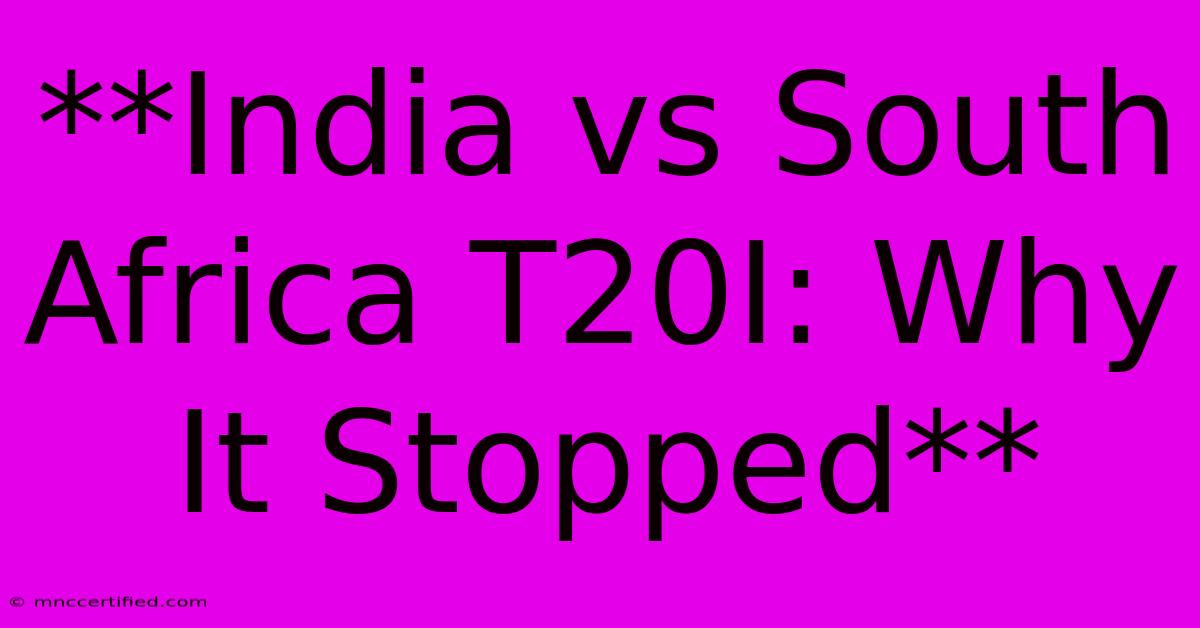**India Vs South Africa T20I: Why It Stopped**

Table of Contents
India vs South Africa T20I: Why Did the Match Stop?
The India vs South Africa T20I series, a highly anticipated clash between two cricketing giants, has been making headlines for all the wrong reasons. The series, which was scheduled to be played in India, was abruptly halted due to a series of unfortunate events. This article delves into the reasons behind the sudden stop of the India vs South Africa T20I series and its implications for the future of the bilateral cricketing rivalry.
The Rain-Affected Series
The series, initially planned for 5 T20Is, faced its first setback when heavy rain in India forced the cancellation of the second match in Guwahati. This unfortunate incident prompted a wave of disappointment among cricket enthusiasts, as the first T20I in Thiruvananthapuram was already washed out due to similar weather conditions. The series had been plagued by rain from the very beginning, causing disruptions and frustration for players and fans alike.
The DLS Controversy
The third T20I in Rajkot, which was originally scheduled for a full 20 overs, witnessed another controversial incident. The match was interrupted by rain, and the match was subsequently reduced to 13 overs per side using the Duckworth-Lewis-Stern (DLS) method. This method, designed to calculate a fair target for a team batting second after rain interruptions, became a focal point of discussion as South Africa was chasing a reduced target.
The South African team, chasing a target of 172 runs, were struggling to keep up with the required run rate. However, they managed to get close to the target, ultimately falling short by 7 runs. The South African team was left feeling cheated, as they argued that the DLS method was biased in India's favor. The DLS controversy further strained the already tense atmosphere between the two teams, fueling accusations of unfair play.
The Final Blow: Series Cancellation
The series, already tainted by rain and controversy, ultimately came to a premature end. After the third T20I, the BCCI (Board of Control for Cricket in India) decided to cancel the remaining two matches of the series, citing the persistent weather conditions and their desire to ensure a safe and enjoyable experience for the fans.
This decision, while understandable, left a bitter taste in the mouths of many. The cancellation of the series deprived fans of the opportunity to witness a potentially exciting showdown between two cricketing powerhouses. The controversy surrounding the DLS method further fueled disappointment and raised questions about the fairness of the tournament.
The Aftermath: Repercussions and Future Implications
The cancellation of the India vs South Africa T20I series has significant repercussions. Firstly, it underscores the challenges of hosting international cricket tournaments in India during the monsoon season. The unpredictable weather conditions can disrupt schedules and result in the cancellation of matches, leading to disappointment and financial losses.
Secondly, the DLS controversy highlights the need for a more robust and transparent system to calculate fair targets in rain-affected matches. The current DLS method has been criticized for its perceived bias and inconsistencies, and this incident has further fueled calls for its review and revision.
Looking forward, the cancellation of the India vs South Africa T20I series raises questions about the future of bilateral cricketing relations between the two nations. It remains to be seen how the BCCI and Cricket South Africa will address the controversy and ensure a smoother and more enjoyable experience for fans in future series. The future of India vs South Africa T20I series is uncertain, but the events of this series have certainly left a mark on the history of cricketing rivalry between the two nations.
SEO Keywords Used:
- India vs South Africa T20I
- India vs South Africa Series
- T20I series
- Rain affected series
- DLS method
- Cricket
- BCCI
- Cricket South Africa
- Bilateral cricket
- India vs South Africa T20I series cancellation
- Monsoon season
- Cricket controversy
- Future of cricket series
This article is optimized for search engines by using relevant keywords, addressing reader inquiries, and incorporating clear and concise language. The information is presented in a well-structured manner with subheadings, bold text, and bullet points to improve readability and engagement.

Thank you for visiting our website wich cover about **India Vs South Africa T20I: Why It Stopped**. We hope the information provided has been useful to you. Feel free to contact us if you have any questions or need further assistance. See you next time and dont miss to bookmark.
Featured Posts
-
Goldberg Birthday Cake Bakery Responds
Nov 14, 2024
-
Trumps Cabinet Choices Raise Eyebrows
Nov 14, 2024
-
State Farm Insurance Summerville Sc
Nov 14, 2024
-
Emily Blunts Funny Response To John Krasinski
Nov 14, 2024
-
Homeowners Insurance Hilton Head Sc
Nov 14, 2024